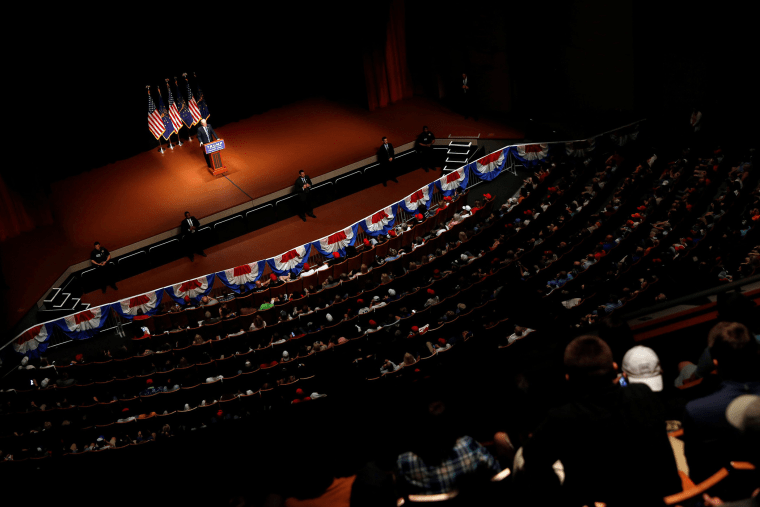EVANSVILLE, Indiana — Donald Trump continued his pivot toward the general election on Thursday with a low-key but energetic Indiana rally where he made his case against Hillary Clinton.
"I will be so much better to women than Hillary Clinton is — for healthcare issues, on the protection of our country," he told a crowd of more than 2,500 seated in an auditorium here.
He also set the stakes of the Indiana primary, saying he refused to take any time off from the campaign trail because of how important the primary is.
"If we win in Indiana, it's over," he said.
RELATED: Cruz and allies have five days to stop Trump
Trump in particular told the audience that he could expand the map in a general election fight against her, saying she can't win New York because the Clintons "abandoned Arkansas for New York" and thus aren't "real New Yorkers." He also insisted Clinton "doesn't do great in Arkansas," despite the fact she and her husband started their political careers there.
It's a somewhat unconvincing argument, as Clinton did in fact win the Arkansas Democratic primary, and Arkansas is unlikely to be in-play in a general election. But it's a hint at where Trump's focus lies following a night of resounding primary wins across the Northeast on Tuesday that put him considerably closer to the nomination — and created a major setback for opponents hoping to force him to a contested convention.
Indiana remains their best possible opportunity to knock Trump off-course from the 1,237 delegates he needs to win the nomination outright, and Sen. Ted Cruz and Ohio Gov. John Kasich have spent the past week hoping to do just that.
Cruz attempted to reset the narrative around his multiple last-place finishes Tuesday night by announcing former challenger Carly Fiorina as his running-mate on Wednesday. But Trump dismissed their pairing, saying it's "not gonna help," and that Fiorina had "one good debate—on the children's stage."
In another move aimed at blunting Trump's momentum, Cruz announced an agreement with the last remaining contender in the race, Ohio Gov. John Kasich, to split up their efforts in coming primary states in an effort to coalesce the anti-Trump vote behind a single candidate. But that alliance is already showing signs of fraying, and Trump on Thursday said he thought it might backfire.
"I have a feeling it's not a good thing. Cruz looks like a fool. He can't make a deal," he said.
Indeed, Trump's own pivot to the general election has been bolstered this week by signs the GOP establishment is warming to him, despite the fact he's built his entire campaign on decrying and dismissing the Republican Party. On Thursday, he picked up two more congressional endorsements, and Tennessee Sen. Bob Corker hinted on MSNBC his endorsement may be impending.
Corker, chairman of the Senate Foreign Relations Committee, praised Trump's Wednesday foreign policy speech in an interview with Andrea Mitchell, and said he "may change my mind" about remaining neutral in the GOP primary. Trump himself said in Indiana that he spoke to Corker that day, but offered no details about their exchange, only calling Corker a "fantastic" senator.
This article first appeared on NBCNews.com.
